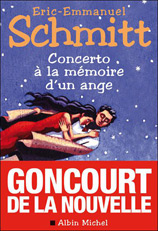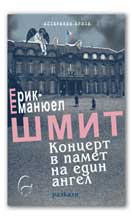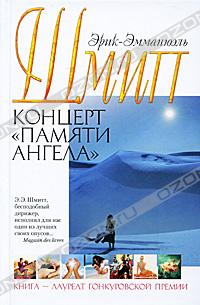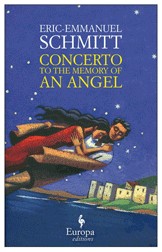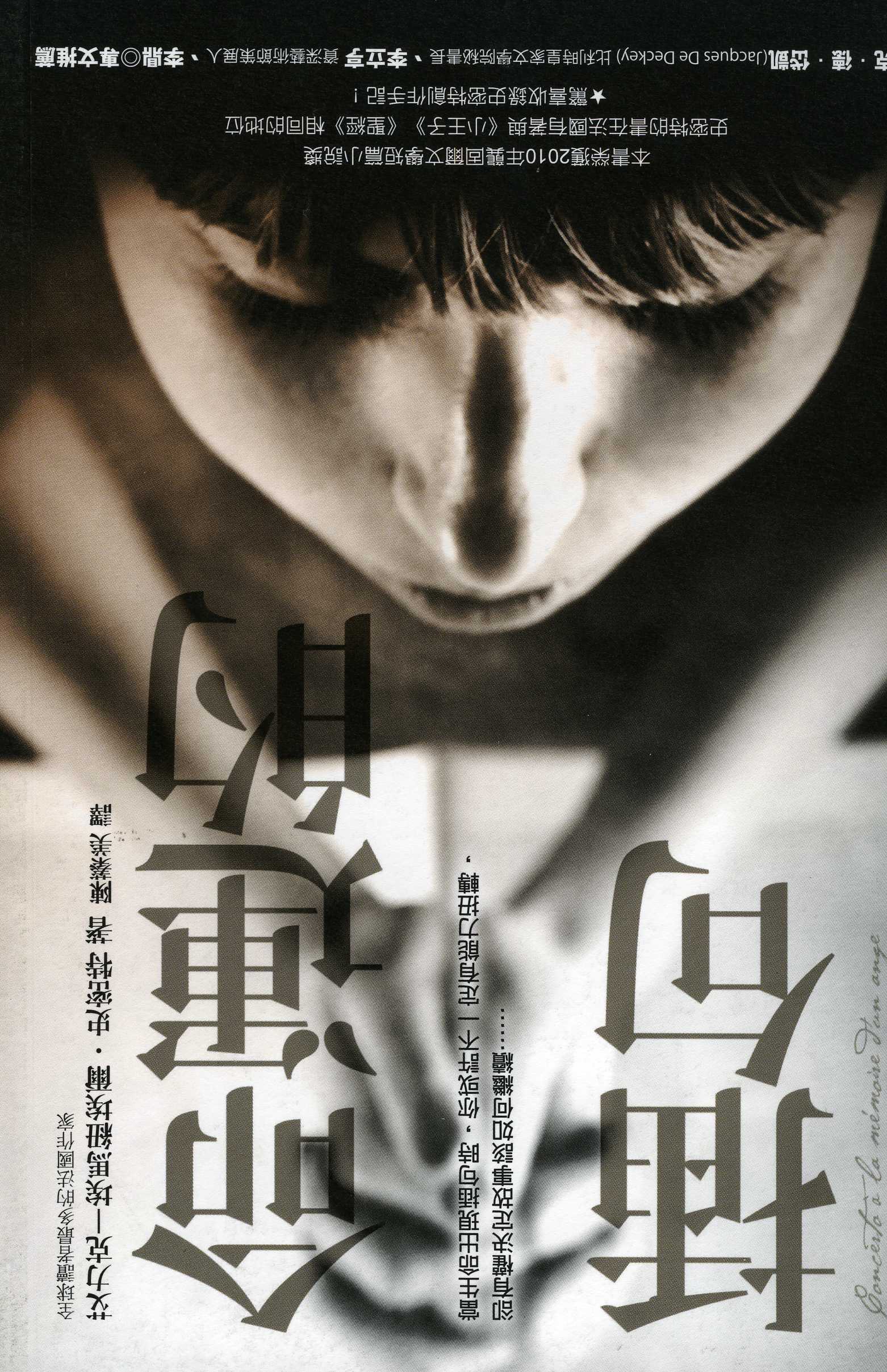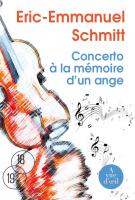Masterclass
Trailers
Monsieur Ibrahim et les Fleurs du Coran
x (x)
x (x)
x (x)
x (x)
x (x)
x (x)
View all trailers
Summary
What has a woman who poisons her husbands one after the other to do with an amorous President of the Republic? What is the link between a sailor and an international crook selling religious souvenirs made in China? By what miracle does Saint Rita, patron saint of desperate causes, become the mysterious guide of their lives?
All these heroes might have made amends and chosen light over darkness. Each of them was once offered redemption. Some of them accepted, others refused, a few didn't even notice. In this collection, four stories interweave.
Four stories that trace the ordinary and the extraordinary of every life. Four stories that explore the question: are we free or do we all have a fate? Can we change?
Concerto in Memory of an Angel is followed by the diary Éric-Emmanuel Schmitt kept while he wrote the collection.
Reviews
Le Figaro littéraire - « Variations on the theme of redemption »
This is Éric-Emmanuel Schmitt's third collection of short stories. With humour - often of the black variety - and deceptive naivety, the former philosophy lecturer explores the theme of redemption and demonstrates, not for the first time, his consummate skill in making his ideas and musings accessible to the general public.
[...] Unsettling and touching, these short stories explore dark, complex situations. In Éric-Emmanuel Schmitt's hands, they become simple and ethereal.
Blaise de Chabalier
France soir - « Interview »
He became a best-seller in the early years of the millennium on the basis of his novels and popular short stories, like Odette Toulemonde or Oscar and the Lady in Pink.
Eric-Emmanuel Schmitt is a master of all trades. At 49, this Franco-Belgian playwright, short story writer, novelist and film director, has become one of the most widely read French-language authors in the world. Today, he has just published his third collection of short stories, Concerto in Memory of an Angel, a polyphonic series of four stories seen through the lens of redemption.
FRANCE-SOIR. Concerto in Memory of an Angel is half-way between philosophy and fiction. How would you define your book?
ÉRIC-EMMANUEL SCHMITT. I'm a philosopher by trade and instinct, but I'd say it sits somewhere between the fable and the novella. The question that underpins these stories is: can we change? So, it revolves around issues of redemption and damnation.
The characters in these four stories have a painful past, but they really want to move on. You seem to be an incorrible optimist...
Yes, absolutely. I know I make some uncompromising claims, but I believe in human intelligence. We can all improve. We can't change completely, the past has the weight we give it. I believe in psychological not religious redemption.
Why have you made religion a red herring?
It's not a red herring. It's the excuse for my characters to develop. If nothing else, God is the best of Man. The references to God are just ways in which man rises above his egoism.
Since 2006, you've published three books of short stories. What is it you like about this literary exercise?
Writing a novel is just as difficult as writing a short story. The short story is a drawing, the novel is a painting. With the short story, you have to get to the essential. The style is pithy, and you can't spread yourself out and be too chatty.
But the novella is not exactly the most popular literary genre in France...
You can't say that, because my two previous collections sold over 200,000 copies! Readers loved Odette Toulemonde and Other Stories. Anyway, it's worth it for the appreciation of my fellow writers. I get letters from them thanking me for making publishers less reluctant to publish short stories. Between Anna Gavalda's stories and my own, we've made progress.
You aren't a man of a single passion. You've worked in the theatre, film... Why the diversity?
The arts are all inter-linked. It comes from my appetite and my curiosity. People used to tease me when I was small: if I visited an art gallery, I had to have a box of paints bought for me; if I went to the ballet, I had to be enrolled in a dance class. I've always been excitable. I want to do things. Most of all, it's not up to me to decide what I do best, so as soon as life offers an opportunity, I grasp it.
In France, it's difficult to wear several hats. Weren't you afraid of being criticized?
It represents genuine freedom. I think, in France, success is more a source of envy than admiration, consequently people refuse to see someone find their place in several disciplines. It's petty-minded and I can do without it.
Have people held your success against you?
Success alters the way some people see me. Sometimes, they read me not to enjoy my writing but to know where I get my fame. Suddenly, you become a best-selling author. You're never the author of your success.
Magali Vogel
La Provence - « Freedom and Chance, according to Schmitt »
All of Eric-Emmanuel Schmitt's books develop the idea that the world is not absurd but mysterious. Meaning is hidden from us and our job is to discover it through the work of reflection.
In other words, the author is a proponent of Pascalian rather than Camusian thought. In a play like Two Worlds Hotel (1999), Eric- Emmanuel Schmitt evoked death, the phenomenon of resilience and the notion of chance, using a plot with strong philosophical underpinnings. He employs similar strategies in Concerto in Memory of an Angel, a collection of four short stories that are all interlinked.
Eric-Emmanuel Schmitt, a doctor of philosophy, nevertheless suggests we treat all these ideas with lightness, humour and imagination, but also with gravity yet without pathos.
This is a wonderful book that is a joy to read.
Jean-Rémi Barland
La Dernière Heure (Belgique) - « Delightful new stories from Eric-Emmanuel Schmitt »
By stamping his hallmark, in Odette Toulemonde (and other stories), on an art form traditionally neglected by French literature, Eric-Emmanuel Schmitt has done the short story a favour. For, he has given it a kind of asceticism that suits it. The different narratives that make up Concerto in Memory of an Angel are united by the common theme of Saint Rita, patron saint of desperate causes.
Isabelle Monnart
Bsc News Magazine - « An astonishing concerto »
A libidinous Bible-basher, a vengeful first lady of France, a professional but handicapped violinist and a conscientious sailor, all confronted by the problem of repentance. With captivating realism and simple cruelty, Eric-Emmanuel Schmitt shows them struggling with their emotions.
These four stories, each one a skilful telling of a fall, are pertinent depictions of violent inner turmoil. In the literary diary that helpfully concludes the book, the author explains that it is totally possible to create intense links between short stories, or ‘topoi', so that they echo and reflect each other.
[...] To say more would be to spoil the element of surprise and do a disservice to the dazzling style. Suffice it to say that it is a book to read avidly.
The new Eric-Emmanuel Schmitt has been in French bookshops for a while, so make haste to procure your copy!
Julie Cadilhac
L'Express - « Angel or devil? »
Eric-Emmanuel Schmitt likes to unsettle his readers. These four short stories are really four chapters of a perfectly coherent book. If he were a pedant, Schmitt might have called it, ‘Fate or Freedom'. Because he is a novelist, he chose instead ‘Concerto in Memory of an Angel'. His touch is light where it might have been leaden and he prefers questions to answers. The questions he asks in these stories involve the enigma that vexes all of us at some point in our lives: can we change? Marguerite Yourcenar's answer was: "We don't change, we grow deeper." André Gide's acid comment was: "You have to go along your slope... just so long as you go up it." Eric-Emmanuel Schmitt merely sets the scene with contrasting characters then leaves us to draw our own conclusions. Yet all the protagonists have one thing in common: all of them flirt with death, murder and agony.
With their unpredictable endings, the stories reveal the playwright's stamp. If the villain can go straight, the opposite is just as possible and the goodie can become a disreputable worm. Who determines this change? Do we decide? Is it circumstance? Is it fate? The characters are faced with all these questions though never so directly. To find the key to them, they have to confront their innermost demons and consent to what few of us are willing to do: follow a frightening path rather than stick to comfortable routine. Above all, they discover that there is nothing intrinsically beautiful or terrible about our lives: it all depends on how we look at them. "Lives are like holy books: we give meaning to them by reading them."
Eric-Emmanuel Schmitt is a master storyteller, but because he knows that every tale demands an exegesis, he rounds off the book with an extract from a private journal, which, he tells us, he has kept since he started writing. Rather than indulging in lengthy private confessions, however, he includes only those pages that are concerned with the short stories. It works to perfection, like a ‘free gift' in addition to a wonderful book of heroes who will haunt readers for a long time to come.
François Busnel
Carrefour des savoirs - « Concerto in Memory of an Angel »
Another superb book from this best-selling novelist, playwright and film director. Consisting of a series of short stories, each more fascinating than the last, Éric-Emmanuel Schmitt's concerto provides the kind of music you don't want to end. The leitmotif running through them all is Saint Rita, a saint for every occasion.
Schmitt leads us into the troubling universe of a female poisoner - who bears more than a passing resemblance to the "Good Lady of Loudun", aka, Marie Besnard - in thrall to her passion for a young priest. Then follows a reflection on love for one's family and how we express it (or not), in the story of the sailor who is told at sea of the death of one of his daughters. He has four and is not told which one has died: for which daughter should he grieve? The next story gives the book its title. This is a delicately handled tale about what we become as we grow up. What remains in adulthood of the personality developing in the teenager? Will sweetness always be sweet and harshness always harsh? The collection ends with a story about love in the French Presidential offices that makes a touching ode to love in the gilt-edged setting of the Elysée Palace. So, only the best will do!
Impact Médecine - « Concerto in Memory of an Angel »
Eric-Emmanuel Schmitt has taken his title from a concerto by Alban Berg that describes an angel's trajectory to heaven. In four comic stories, the author composes modern parables about redemption, forgiveness and freedom. Different though they are, involving characters as diverse as a woman who poisons her husbands, a love-sick President of the Republic, an honest sailor and an international crook, all of the characters are torn between light and dark. Saint Rita acts as the arbiter of their dilemmas.
Jean-Michel Ulmann
Le Parisien - « A splendid concerto by Eric-Emmanuel Schmitt »
Impossible not to be struck by the author's skill in handling the delicate art of the short story, as he leads his reader from compartment to compartment, as though in a train. The book ends with the fascinating log Schmitt kept while he wrote the collection. Concerto in Memory of an Angel should be on every philosophy student's reading list. It cannot fail to delight anyone who likes their literature ‘with accompaniment' (it really does make a superb concerto), as well as all those - and they are many - who ponder the meaning of life. The book bears comparison with Flaubert's Trois Contes. A small masterpiece.
Pierre Vavasseur
Télé2 - « Saint Rita to the rescue »
We liked this book enormously. Éric-Emmanuel Schmitt is a virtuoso short-story writer. The light he casts on the exercise, in the last part of the book, is fascinating. Flaubert's Trois Contes and Maupassant's Maison Tellier come to mind.
What should we do with it? Give it to anyone who ponders existential problems or to young students of philosophy and anyone who likes finely chiselled literature.
Christophe Victor
Nice Matin - « Conversation about destiny »
In Concerto in Memory of an Angel, Saint Rita is the joker in the characters' fates. But in real life, what are the poisoner, the sailor, the artists and the president's wife up to? Are they all free, or are they, rather, victims of determinism?
With aptly chosen words, pertinent descriptions and plausible situations, Eric-Emmanuel Schmitt leaves it to his readers to believe or not in predestination and our ability to change. Following on from Oscar and the Lady in Pink, Monsieur Ibrahim and the Flowers of the Koran and other titles, the author continues his conversations with the reader.
24 Heures (Suisse) - « Uncompromising stories of the world »
The short story is a demanding art form but ideally suited to a playwright long-versed in writing dialogue and creating clear, concise structures. Precise and keen, the philosopher's scalpel isolates situations that evoke the magma of the tabloids fleshed out by the narrator. The collection opens with the darkly comic portrait of a provincial poisoner and a sleazily corrupt confessional scene worthy of Hitchcock. The two central stories probe more intimate, delicate questions in which the lack of love (The Return) and rejected remorse (Concerto in Memory of an Angel) leave a powerful echo. The last story depicts the corridors of power (Love in the Elysée), where the author ventures to set a moving drama.
Jean-Louis Kuffer
Lire est un plaisir - « Concerto in four movements »
Everything comes in threes. Following on from Odette Toulemonde and The Dreamer of Ostend, Eric-Emmauel Schmitt now brings readers four short stories with a common theme. An ardent church-goer, a long-haul sailor, a young virtuoso, murder by pride, and a presidential couple living out love under the public eye share the screen (after all, Schmitt is also a man of the cinema) in his Concerto in Memory of an Angel (Schmitt is not just a fan of Mozart but retains a special place for Berg).
Again, the alchemy is immediate and sustained - the success is total when, as in a piece of music, there is no weak movement/story. Schmitt's artistry glitters with the sparks that lit the fire of The Alternative Hypothesis and The Gospel According to Pilate, Enigma Variations or the two short-story collections referred to above.
I attended the first Concerto in Memory of an Angel. It received a standing ovation.Brice Depasse
Brice Depasse
Les Echos - « Gilt-edged mini-legends »
In the ‘log' which concludes his latest book, Eric-Emmanuel Schmitt laments the neglect suffered by the short story in comparison with the novel. He should now be satisfied: his Concerto in Memory of an Angel, composed of four different ‘movements' (plus the manual), has leapt to the top of the best-sellers' list. True, the French writer has every advantage on his side. His short stories are not of the impressionistic kind: in reality, each one is a short novel that unfolds around a central question: is man a prisoner of his fate or does he have the freedom to make amends? Redemption and damnation are the two wings of the ambiguous angel that presides over this book.
[...] Moral fables, gilt-edged mini-legends: Eric-Emmanuel Schmitt's stories are fiendishly efficient. Schmitt is a prodigious story-teller with a style both elegant and assured. He clearly draws on his experience as a playwright to set traps of willful intrigues that are basically very simple. His dramatic reversals occur with perfect timing and his characters are more complex than they appear [...].
PH. C.
F!mag - « Concerto in Memory of an Angel »
It comes as no surprise, from the author and doctor of philosophy who produced The Alternative Hypothesis and equally superb Ulysses from Baghdad, to be faced with complex concepts conveyed through familiar characters that develop against a background of delightful and universally accessible plots.
La Tribune (Suisse) - « Concerto in Memory of an Angel »
An omniscient narrator - a God both powerful and passive - Schmitt plunges the reader seamlessly into the torments of his characters. For all they are easy to read, however, his books are not lightweight.
France Catholique - « Concerto in Memory of an Angel »
Eric-Emmanuel Schmitt's latest book brings readers four short stories, all as original and exciting as each other.When it comes to probing the human heart, he is as shrewd as François Mauriac.
Brigitte Clavel
Le magazine des livres - « Concerto in Memory of an Angel »
Eric-Emmanuel Schmitt, a peerless conductor, performs one of his finest works. These short stories are like fables without a moral, much like human beings who change according to their aspirations, on a whim or a mood...
Stéphanie Joly
La Tribune de Lyon - « Concerto in Memory of an Angel »
... All Schmitt's literature involves noble values associated with human empathy and spiritual journeys, with Good as an ideal...
Vincent Raymond
La Provence - « Concerto in Memory of an Angel »
... he (Eric-Emmanuel Schmitt) shows that he is an excellent story-teller with a fertile imagination and a marked taste for the miraculous. Eric-Emmanuel Schmitt [...] sets out to treat all these ideas with humour, imagination and a light touch - with gravity, too, but without pathos. This is a beautiful book that makes literature attractive.
Jean-Rémi Barland
La Libre Belgique - « Concerto in Memory of an Angel »
Eric-Emmanuel Schmitt... Not only are his observations spot-on, but the taut, well-spun plots of these crisp short stories intensify his fictional worlds. Luminous, sensitive and fluid, Schmitt's writing testifies to his polymorphous talents, as he explores the duality of light and darkness in human nature, and offers the possibility of redemption. As a champion of the imagination, EES handles the delicate marriage of philosophy and fiction by probing human nature.
Camille Perotti
24 heures (Suisse) - « Concerto in Memory of an Angel »
Clean, concise and uncompromising, the philosopher's scalpel isolates situations suggestive of the magma of the tabloids, which the narrator fleshes out.
Jean-Louis Kuffer
Publications
- In Albanian language, published by Toena
- In Bulgarian language, published by Lege Artis
- In Chinese language, published by The Eurasian Publishing Group
- In Dutch language, published by Uitgeverij Atlas
- In English language (US), published by Europa
- In French language, published by Albin Michel
- In Hungarian language, published by Humanitas
- In Italian language, published by Edizioni e/o
- In Korean language, published by Yolimwon
- In Polish language, published by Wyndawnictwo Znak
- In Romanian language, published by Humanitas
- In Russian language, published by Azbooka
- In Spanish language (US), published by Ediciones Destino
- In Ukranian language, published by Calvaria
- In Vietnamese language, published by Nha Nam

